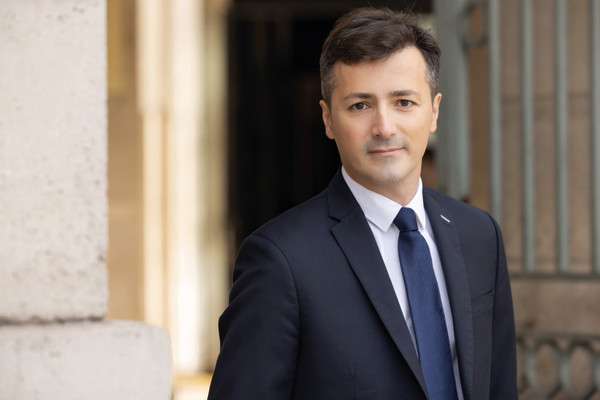
The French asset manager’s chief economist, Raphael Gallardo, speaks to PWM about the impact of the war in Ukraine, the future of Europe and the tribalisation of US politics
Doing the rounds of Europe’s institutional investors, just as the scourge of the Covid-19 pandemic started to recede at the beginning of 2022, Carmignac’s chief economist Raphael Gallardo sounded a note of caution to the firms he visited. Most, emerging from two years of on-off lockdowns, did not receive his warnings too graciously.
“When I voiced my concerns, clients were saying to me: ‘Raphael, you are being too pessimistic. The world is not going to end tomorrow.’ I agreed, but told them they should appreciate more how the world is changing.”
The key difference, already emerging pre-pandemic, but accelerated during the isolation experienced by societies and their political leaders, was the ratcheting up of geopolitical tensions.
As 2022 moved on, clients of the independent French asset manager, running €32bn in assets, became more aware of this geopolitical aspect to their financial affairs, accentuated by Russia’s brutal invasion of Ukraine and the consequent sanctions against Moscow.
“If you are buying a US Treasury bond, you will typically ask yourself: ‘Where will interest rates go,’ suggests Mr Gallardo. “But tomorrow another country may ditch all its US dollar reserves, because they know they may be confiscated by the US Treasury issuing a single decree,” he says, referring to the recent freezing of $300bn in reserves owned by Russia’s central bank. “That is really a huge sea change.”
The biggest economic impact of Russia’s invasion has been the sounding of a death-knell for European manufacturing, he believes. “Europe has lost its industrial competitiveness, as we will never re-import Russian gas for a very long time,” says Mr Gallardo. “Even if we witness a major green transition, it is difficult to see us regaining access to cheap energy.”
Heavily sanctioned Russia is fast becoming an unviable economic entity, he adds. “Their economy is in deep recession, inventories of any imported technology will run dry and all the productive forces of the country have emigrated [from a] terror regime, where no one can speak up.” Even a change of leadership would unlikely foster a return to “cheap and reliable Russian gas” as potential successors to president Vladimir Putin are mostly implicated in the illegal invasion.
Fight the power
Mr Gallardo’s latest round of meetings, heralding the start of 2023, have centred around these new vital components of the asset allocation process. “We are witnessing a worsening situation for European manufacturing plus questions over our future as a manufacturing powerhouse in the industries of the next century,” he asserts. “If you are a European policy-maker, you must take into consideration that the probability of going back to the pre-Ukraine war world is very remote, which is why we need to think about it.”
Typically, a European CEO looking at building an industrial production facility in either Germany or a US state such as Arizona, would now have geopolitical considerations at the top of their agenda. “This is how we built our forecast for Europe for [2023]. We are going to have a small recession in the winter, then a recovery, but capex will be very hesitant, because for manufacturers, energy supply is the key structural issue.”
Mr Gallardo’s cautionary voice is worth listening to. Speaking to PWM at his firm’s headquarters in the plush Place Vendome, round the corner from ‘les grands magasins’ of Galeries Lafayette and Printemps, swamped by both tourists and locals, the scene felt eerily reminiscent of several years earlier.
At the beginning of 2020, during PWM’s last visit to Carmignac, Mr Gallardo’s colleagues warned of a pandemic originating in China, likely to wreak havoc across the global economy and its societies, while many European leaders ignored the threat.
King of wishful thinking
Mr Gallard does however feel sympathy for Europe’s policy-makers, contending with “the fundamental incompatibility” of an inherited institutional architecture comprising “19 fiscal policies” battling one overall monetary policy.
He also understands inherent tensions manifested in anti-EU protests across Germany’s eastern regions, while stopping short of suggesting December’s attempted coup in Berlin was more than a “fringe movement”.
“I think we are seeing the failings of capitalism and of European integration. There are reasons for parts of German society to be unhappy with Europe,” he suggests, believing the European integration project may have included some disingenuous aspects. “Europe had to integrate to avoid division, war and chaos,” he says, “but [former European Commission president Jacques] Delors and [former French president Francois] Mitterand wanted monetary union. Did they force an economic crisis, which would then trigger integration? It’s possible that was a calculation from the start.”
A “nationalistic nostalgia” fuelled by a loss of sovereignty necessary to keep the euro area together was exploited in the UK, much to the country’s eventual detriment, he believes. The view from France was that British authorities had a cunning and economically beneficial ‘Grand Plan’ for Brexit, likely to outsmart their continental counterparts.
“People are now realising there was no plan. It was complete improvisation,” says Mr Gallardo, smiling with a hint of incredulity. “The pandemic was a distraction for three years, but now that it is over, they are going to have to deal with the cost of Brexit. It seems the King is naked and they are in trouble, as nothing worked as planned.”
Continued “soul searching” in the UK’s ruling Conservative party, is expected into 2023, now that polls reveal a sense of regret among those who backed Brexit. “This has weighed on the credibility of policy making,” in a UK already vulnerable to a structural current account deficit, worsening as financing becomes more volatile.
The sense of crisis was amplified by “the accident” of ex-prime minister Liz Truss’s ‘mini-Budget’, suggests Mr Gallardo. “I think this taught a lesson to everybody in Europe. Once you are a current account deficit country, you have an inflation problem on your hands and the only nominal anchor you have for the whole system is fiscal credibility. Once you lose this, everything else breaks down.”
Take out the papers and the trash
The abilities of US policy-makers to handle economic challenges is also called into question. “We are in an environment where economies have been unable to withstand rising interest rates since the end of the 1990s, but we need much higher rates to bring back demand and supply in the US economy. And we are very far from that now,” he suggests.
Based on Amundi’s calculations, the Fed may not want to go higher than 5 per cent, but should re-examine monetary policies associated with its former chair Janet Yellen, who pursued gradual interest rate rises. Ms Yellen fell out of favour with then US president Donald Trump, before her confirmation as secretary of the Treasury by Mr Trump’s successor, Joe Biden.
Amundi’s preferred approach is contrasted by Mr Gallardo to the 1992 ‘Taylor Rule’ of stabilising the economy through lower short-term rates. The latter policy was slammed by “bond king” Bill Gross, former manager of Pimco’s $270bn Total Return Fund, in 2015 for failing to stimulate US growth. Mr Gross believed it should immediately be “discarded into the trash bin of history”.
Mr Gallardo thrives on the intricacies of these calculations and their influence on investment strategies, having worked as a financial engineer, specialising in interest rate risk, at BNP Paribas earlier in his career, before leading macroeconomic research at both Axa Investment Managers and Rothschild & Cie Gestion.
Currently, he believes, the Fed is on a “knife edge” between asset price deflation and goods and services inflation: “If they want to kill inflation, you have to accept there will be a deep recession.”
But deeper problems afflicting the financial system and society around it are beyond the scope and competence of most policy-makers. “We should be questioning the way added value and wealth is shared by market and political forces in US society,” ponders Mr Gallardo. “The social consensus is breaking down and inflation is one of the symptoms of that, although this is beyond the remit of the central bank.”
Two tribes go to war
Increased “tribalisation” of US politics may only exacerbate these issues, with “deep rifts” beginning to separate factions within both political parties. “We will see in 2024 what kind of candidates emerge on the big tickets,” he says, although he is pleasantly surprised by “good news” from mid-term elections at the end of 2022, relating to the defeat of “all the anti-democratic pro-Trump candidates”.
The opportunities and challenges presented for clients by this fast-moving backdrop are debated in Carmignac’s lively investment committee meetings. “We have entered a regime of higher inflation volatility,” suggests Mr Gallardo. “Inflation hedges are really something for investors to look at.”
These portfolio sweeteners include Treasury Inflation-Protected Securities, commodities and real assets. Asset allocators should also analyse the world’s post-Covid re-regionalisation trend, famously described as “Friend-shoring” by Ms Yellen. “The big winner of decoupling between China and the US will be Mexico, so it is interesting to look at assets there,” he says.
First among risks investors should consider is liquidity, he advises, pointing to central banks scaling back balance sheets and to the limiting of client withdrawals by the $69bn Blackstone Real Estate Income Trust in November 2022, recalling the “gating” by hedge funds during the global financial crisis.
With the risk of disturbing the fragile optimism he sees on the cobbled Parisian streets around him, Mr Gallardo offers a stark warning to high net worth investors, pension funds and insurance companies buying up illiquid private assets. “This could be the beginning of something a lot bigger.”



